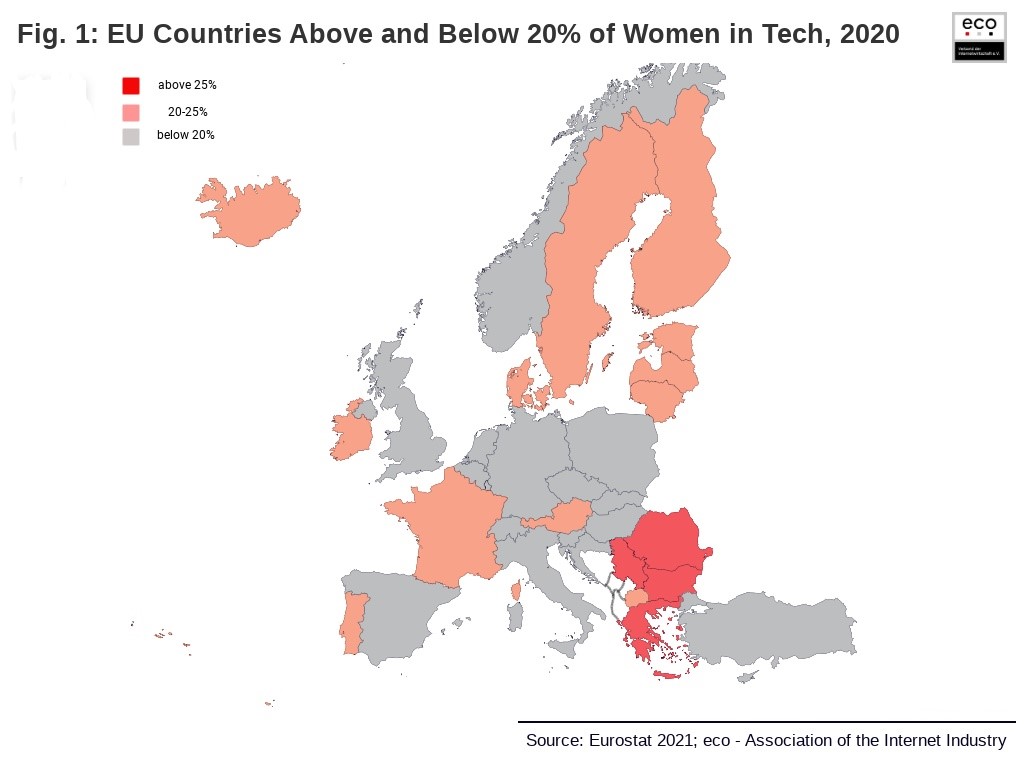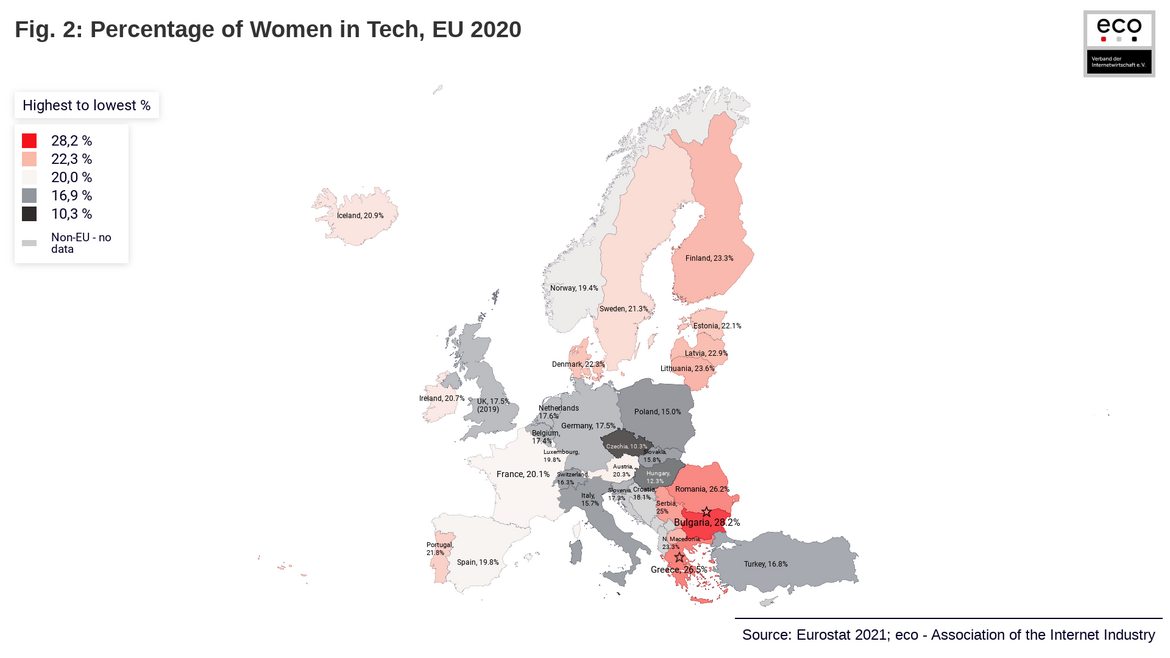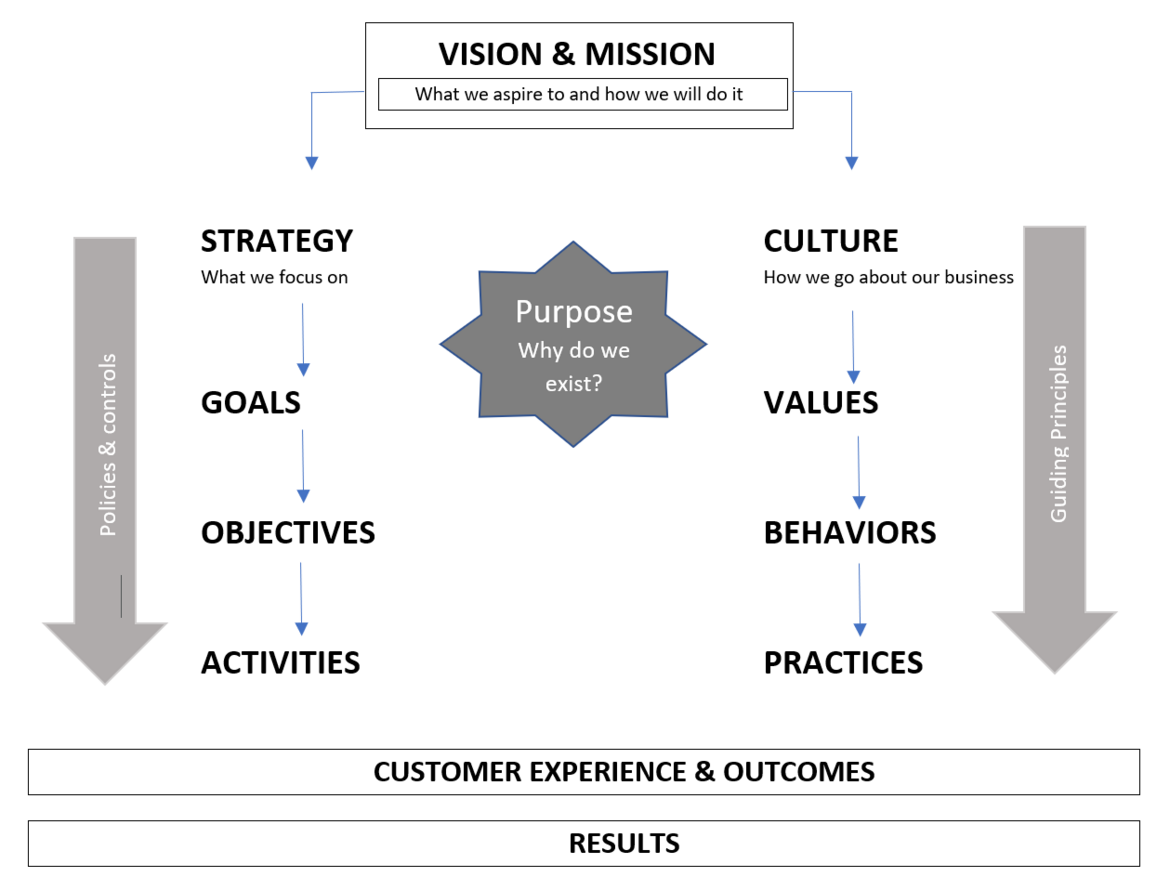Workplace Sustainability Requires More Women in Tech
For a sustainability agenda, a culture of diversity is indispensable, reports Eilín Geraghty from the eco Association. So, how can companies develop this culture?

© jacoblund | istockphoto.com
In pre-pandemic times, the world of work was already being re-shaped by a number of major trends: advancing digitalization, constant change – and a large degree of uncertainty concerning future workplaces. Covid times have not only brought these trends to the fore, but have caused them to sky-rocket. For the digital industry in particular, it’s quite clear as to which of these accelerating trends is massively advantageous – namely, digitalization. But as with all other industries, the digital sector is not immune to issues of high-voltage change and uncertainty. This is prompting employers to intensively mull over the question of: What can we do to ensure that we have a thriving working life for our company as we move into the future?
Here, a contemporary analyst of the future of work, Kevin Empey, provides solid advice. For a future-proof workplace, two key factors which companies require are:
1) agility (think of adaptability and resilience);
2) a sustainability agenda, replete with progressive labor practices.
For such a sustainability agenda to function, a core element for each and every company is a diversity-based culture. For tech companies in particular, this is an absolute must. As highlighted in a recent webinar on Diversity in Tech held by the European Internet Forum (EIF), diversity is not just a prerequisite for innovation and creativity, but is also essential for building trust – both internally within the company, and externally with customers. Ultimately, with the rising significance of the digital industry’s role for society and the economy, there is simply no sector for which a full representation of society is more important.
Where does your workplace stand when it comes to diversity?
There’s no question about it: Gender equality is the bedrock of diversity. So, if your company already has an equal number of women and men employed as tech specialists, then you’ve probably already got that diversity-based culture “in the bag”. However, in the common world, your company is far more likely to have to hold its hands up and acknowledge that it is far from reaching the 50:50 “holy grail” of gender equality. Because in the United States, approximately 25 percent of tech specialists are women – and, in Europe, this is even lower, at 18.5 percent. This reality is illustrated in Figure 1 below, which reveals just how many European countries have less than a 20:80 gender ratio in the digital sector.

There is nevertheless a cluster of countries in Europe which offers a level of inspiration for the future. As Figure 2 shows, in Bulgaria, Greece, Romania, and Serbia, over a quarter of tech experts are women. Admittedly, even these countries are still a considerable distance away from the UN’s aspiration to have a 50-50 gender balance in the world of work by 2030.
Nonetheless, their stronger figures reveal how culture can make a real difference. With luck (and sound judgment), this should galvanize policy-makers and the entire digital industry across Europe to strive for the following goal: to have a minimum of 25 percent of Women in Tech by 2025.

Is the impact of Covid times on Women in Tech positive or negative – or both?
In order to weigh up the prospect of actually attaining a 25:75 female/male ratio by 2025 (as a step along the path to the UN’s 50:50 ambition), there is a need to assess current trends. Given the upsurge in digitalization and workplace transformation triggered by Covid times, many of us are speculating on whether far more women are likely to enter – and stay – in the tech world. But the reality is that, in the short-term, this doesn’t seem to be likely. As Figure 3 below shows, in Europe, things may have improved marginally (compared to the US, where figures have dropped slightly), but the rise in Europe has occurred more at a snail’s pace than at breakneck speed. From 2019 to 2020, there was a rise of just 0.6 percent in the percentage of Women in Tech in Europe, with only minimal growth occurring across the continent.
Fig. 3: Growth in Percentage of Women as Tech Specialists in the EU (Selected Countries) and the US, 2019-2020

Sources: Eurostat 2021 (last update, 13.07.2021), US Bureau of Labor Statistics
This situation is being scrutinized at multiple levels across the EU. In the recent EIF webinar on Diversity in Tech, the host and MEP Maria da Graça Carvalho confirmed that the position of Women in Tech is not improving. On the contrary, she pointed to a sinking rather than a growing number of female ICT students, as well as “the phenomenon of the leaky pipeline”, one which has been exacerbated by Covid times. During this era, women are those who have borne the greater brunt when it comes to key areas such as childcare.
It is therefore no surprise to learn from a 2021 TrustRadius report that 57 percent of Women in Tech feel burned out at work this year, compared to 36 percent of men, and that women are more than twice as likely as men to have lost their jobs. Similarly, a report from Kaspersky reveals that around half of women in the tech space believe that the effects of Covid-19 have actually delayed, rather than enhanced their career progression.
Agnes Heftberger, a Managing Director of IBM Germany, and the 2020 winner of the eco://award in the ‘Ladies in Tech’ category sums this up as follows: “The bottom line is that we are making very slow progress. We still have a long way to go.”
Nonetheless, as pointed out by eco Association’s Chief People Officer Lucia Falkenberg, Covid times also offer some room for optimism in the future, with a greater acceptance of remote working and flexibility likely to have a positive long-term impact on women in particular. This is also acknowledged by the aforementioned Kaspersky report, which refers to “an unforeseen and (hopefully) one-time opportunity to accelerate change.”
That being said, the Kaspersky report proceeds to observe that this change will only take place “as long as the impact of remote working is met by a tech industry-driven ambition to transform its biases and the way it is marketed.” As Lucia Falkenberg succinctly puts it: “Companies need to strongly signal that they will offer the culture and flexibility needed not just during Covid times – but also beyond”.
Such insights drive home the distinct value of an employment sustainability agenda. To achieve this, what is crucial is to have two pillars: both strategy and culture.
These two pillars are mutually dependent, with strategies themselves only likely to be sustainable if they are backed up by culture. Essentially, culture is what determines workplace behavior and decision-making, and decides what gets acknowledged and rewarded. This is spelt out by Kevin Empey in his graphic, “Culture: The Mechanism for Executing Strategy” (see Figure 4 below).
Fig. 4: “Culture: The Mechanism for Executing Strategy”

Source: Empey, Kevin (2021) Thrive in the Future of Work, Oaktree Press, Cork, Ireland
In considering how to build and boost such pillars within the tech industry, detailed insights and recommended activities can be picked up from the eco Association’s 2020 study on Women in Tech Across the Globe: A Good Practice Guide for Companies. In addition, recommendations derived from the European Internet Forum’s webinar on Diversity in Tech are well worth taking on board.* These include the following:
The commitment to diversity must come from the top.
|
In the next year, there is likely to come a time when Covid starts loosening its grip and companies will face decisions regarding the dynamic they want to choose in moving into the future. For tech workplaces, a key decision is to build a diversity-based culture which encompasses activities such as those presented above. In the long run, such a culture is primed to be the make or the break for employment sustainability.
* The cited recommendations from the EIF webinar were offered by the host MEP Maria da Graça Carvalho, and the following panel members: Monika Ladmanova, Adviser to the Vice-President Jourova, European Commission; Angelique de Vries-Schipperijn, Executive Vice President & CEO Northern Europe, Salesforce; and Mechtild Walser-Ertel, Global Head of Human Resources and Corporate Social Responsibility, Orange Business Services.
Eilín Geraghty is Project Manager in the eco International team at eco - Association of the Internet Industry, and author of the eco Association study “Women in Tech Across the Globe: A Good Practice Guide for Companies”. Before joining eco in 2017, Eilín worked for over two decades as a manager, a consultant, and a lecturer - with the common thread running through her career being a focus on inclusion and equality.





